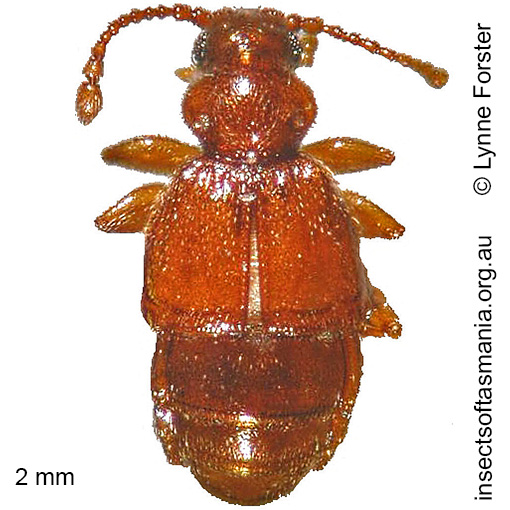
(a species of ant-like litter-beetle)
Basis for Tasmanian occurrence
TMAG collections
Classification
Order: Coleoptera
Suborder: Polyphaga
Superfamily: Staphylinoidea
Family: Staphylinidae
Subfamily: Pselpahinae
Tribe: Brachyglutini
Morphology
Typical length (mm): 2
Flightedness: winged and assumed capable of flight
Ecology
Assumed larval feeding: predator
Association with dead wood or old trees: at least facultatively saproxylic
Ecological attributes: — Affiliated with regeneration forest (Baker et al., 2009a) — Affiliated with younger trees (Harrison, 2007) — Affliliated with young (ex-clearfelled) forest (Baker, 2006a) — Avoids mature (unlogged) forest (Baker et al., 2007a).
Collection method(s) for TMAG material: — Emergence trapping from cut billets of Eucalyptus obliqua (Harrison, 2007) — Emergence trapping from log of Eucalyptus obliqua — Flight intercept trapping (trough below Malaise trap) — Hand collection (substrate not specified) — Malaise trapping — Pitfall trapping — Sticky trapping on Eucalyptus obliqua — Trunk window trapping (Harrison, 2007).
Source ecological literature:
Grove, S.J. (2009b). Beetles and fuelwood harvesting: a retrospective study from Tasmania’s southern forests. Tasforests 18: 77-99.
Hopkins, A.J.M. et al. (2005). Wood decay fungi and beetle assemblages associated with living Eucalyptus obliqua trees: early results from studies at the Warra LTER Site, Ta
Baker, S.C. (2000). Forest litter beetles and their habitat: a comparison of forest regenerated by wildfire and logging practices. Hons. thesis, Univ. of Tasmania, Hobart.
Harrison, K.S. (2007). Saproxylic beetles associated with habitat features in Eucalyptus obliqua trees in the southern forests of Tasmania. PhD thesis, Dept. of Zoology, Univ. of Tasmania, Hobart.
Yee, M. (2005). The ecology and habitat requirements of saproxylic beetles native to Tasmanian wet eucalypt forests: potential impacts of commercial forestry practices. PhD thesis, Univ. of Tasmania, Hobart.

